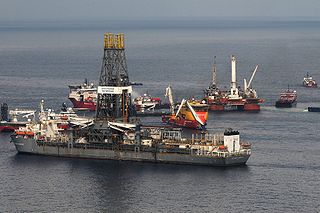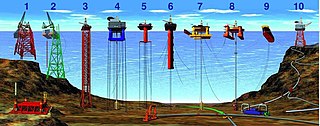
Chevron Corporation is an American multinational energy corporation predominantly specializing in oil and gas. The second-largest direct descendant of Standard Oil, and originally known as the Standard Oil Company of California, it is headquartered in San Ramon, California, and active in more than 180 countries. Within oil and gas, Chevron is vertically integrated and is involved in hydrocarbon exploration, production, refining, marketing and transport, chemicals manufacturing and sales, and power generation.

The Texas City refinery explosion occurred on March 23, 2005, when a flammable hydrocarbon vapor cloud ignited and violently exploded at the isomerization process unit of the BP oil refinery in Texas City, Texas, killing 15 workers, injuring 180 others and severely damaging the refinery. All the fatalities were contractors working out of temporary buildings located close to the unit to support turnaround activities. Property loss was $200 million. When including settlements, costs of repairs, deferred production, and fines, the explosion is the world's costliest refinery accident.
The oil and gas industry is usually divided into three major sectors: upstream, midstream and downstream. The upstream sector includes searching for potential underground or underwater crude oil and natural gas fields, drilling exploratory wells, and subsequently operating the wells that recover and bring the crude oil or raw natural gas to the surface.

Big Oil is a name sometimes used to describe the world's six or seven largest publicly traded and investor-owned oil and gas companies, also known as supermajors. The term, particularly in the United States, emphasizes their economic power and influence on politics. Big Oil is often associated with the fossil fuels lobby and also used to refer to the industry as a whole in a pejorative or derogatory manner.

The Abu Dhabi National Oil Company, known by its acronym ADNOC, is the state-owned oil company of the United Arab Emirates (UAE).
Subsea technology involves fully submerged ocean equipment, operations, or applications, especially when some distance offshore, in deep ocean waters, or on the seabed. The term subsea is frequently used in connection with oceanography, marine or ocean engineering, ocean exploration, remotely operated vehicle (ROVs) autonomous underwater vehicles (AUVs), submarine communications or power cables, seafloor mineral mining, oil and gas, and offshore wind power.
PRODML is a family of XML and Web Services based upstream oil and natural gas industry standards from Energistics and its PRODML Special Interest Group.

BP p.l.c. is a British multinational oil and gas company headquartered in London, England. It is one of the oil and gas "supermajors" and one of the world's largest companies measured by revenues and profits. It is a vertically integrated company operating in all areas of the oil and gas industry, including exploration and extraction, refining, distribution and marketing, power generation, and trading.
In the petroleum industry, Integrated operations (IO) refers to the integration of people, disciplines, organizations, work processes and information and communication technology to make smarter decisions. In short, IO is collaboration with focus on production.

The oil and gas industry plays a central role in the economy of the United Kingdom. Oil and gas account for more than three-quarters of the UK's total primary energy needs. Oil provides 97 per cent of the fuel for transport, and gas is a key fuel for heating and electricity generation. Transport, heating and electricity each account for about one-third of the UK's primary energy needs. Oil and gas are also major feedstocks for the petrochemicals industries producing pharmaceuticals, plastics, cosmetics and domestic appliances.

This article covers the effect of the Deepwater Horizon disaster and the resulting oil spill on global and national economies and the energy industry.
On May 30, 2010 a 6-month moratorium on all deepwater offshore drilling on the Outer Continental Shelf was declared by U.S. Secretary of the Interior Ken Salazar. The limitation was in response to the Deepwater Horizon oil spill which occurred in the Gulf of Mexico.

Fracking in the United Kingdom started in the late 1970s with fracturing of the conventional oil and gas fields near the North Sea. It was used in about 200 British onshore oil and gas wells from the early 1980s. The technique attracted attention after licences use were awarded for onshore shale gas exploration in 2008. The topic received considerable public debate on environmental grounds, with a 2019 high court ruling ultimately banning the process. The two remaining high-volume fracturing wells were supposed to be plugged and decommissioned in 2022.

Dana Energy is a private oil and gas company headquartered in Tehran, Iran. It is an exploration and production (E&P) and oilfield services company operating in Middle East and Asia. Formed in 2000, they were initially an oilfield services company and ventured into field development in 2008. By the addition of petroleum products trading to its portfolio in 2013, Dana Energy extended their business into the midstream sector, however due to sanctions imposed on Iran, their trading division came to a halt.

The Deepwater Horizon investigation included several investigations and commissions, among others reports by National Incident Commander Thad Allen, United States Coast Guard, National Commission on the BP Deepwater Horizon Oil Spill and Offshore Drilling, Bureau of Ocean Energy Management, Regulation and Enforcement, National Academy of Engineering, National Research Council, Government Accountability Office, National Oil Spill Commission, and Chemical Safety and Hazard Investigation Board.
Shale gas in the United Kingdom has attracted increasing attention since 2007, when unconventional onshore shale gas production was proposed. The first shale gas well in England was drilled in 1875. As of 2013 a number of wells had been drilled, and favourable tax treatment had been offered to shale gas producers.

Offshore installation security is the protection of maritime installations from intentional harm. As part of general maritime security, offshore installation security is defined as the installation's ability to combat unauthorized acts designed to cause intentional harm to the installation. The security of offshore installations is vital as not only may a threat result in personal, economic, and financial losses, but it also concerns the strategic aspects of the petroleum market and geopolitics.
ISO Technical Committee 67 – Oil and gas industries including lower carbon energy is a technical committee within the International Organization for Standardization (ISO). ISO/TC 67 is responsible for developing and maintaining international standards in the worldwide upstream, midstream and downstream oil and gas industry and related lower carbon energy activities. Its role encompasses the harmonisation of standards for facilities, equipment and operations used for drilling, production, pipeline transport and processing of liquids and gaseous hydrocarbons on, and between, offshore oil and gas installations and onshore terminals and oil refineries.
Australia is a major petroleum producer and importer, with a number of petroleum companies involved in upstream and downstream operations. Western Australia is the largest contributor to Australia's production of most petroleum products.











